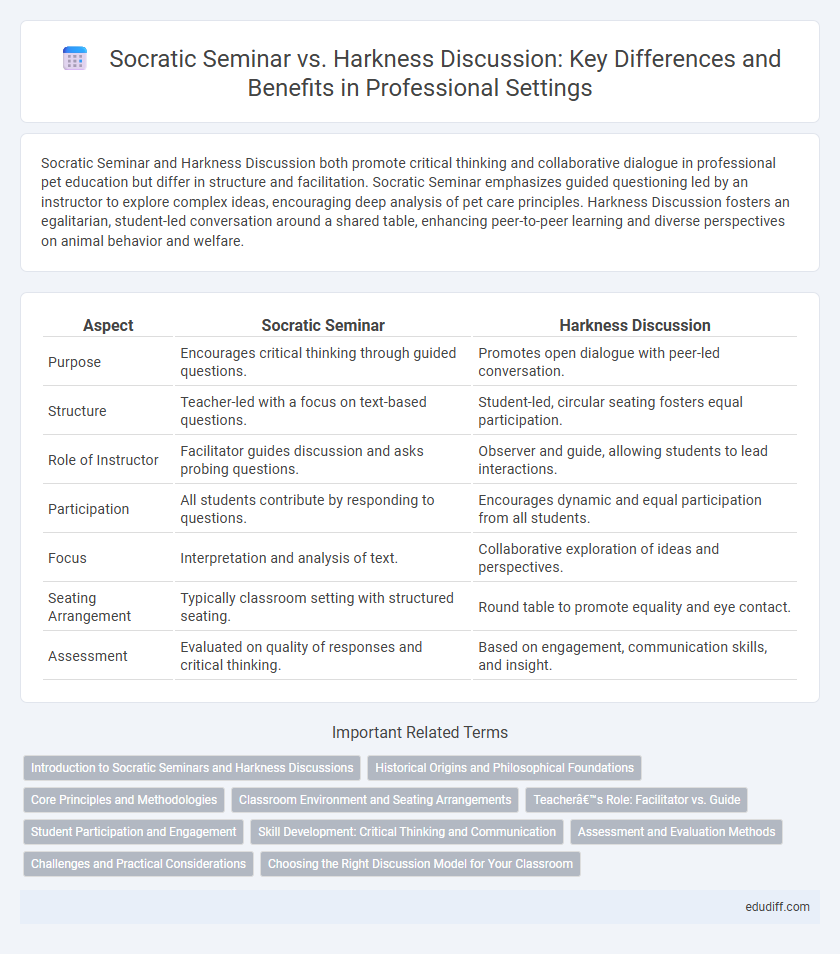Socratic Seminar and Harkness Discussion both promote critical thinking and collaborative dialogue in professional pet education but differ in structure and facilitation. Socratic Seminar emphasizes guided questioning led by an instructor to explore complex ideas, encouraging deep analysis of pet care principles. Harkness Discussion fosters an egalitarian, student-led conversation around a shared table, enhancing peer-to-peer learning and diverse perspectives on animal behavior and welfare.
Table of Comparison
| Aspect | Socratic Seminar | Harkness Discussion |
|---|---|---|
| Purpose | Encourages critical thinking through guided questions. | Promotes open dialogue with peer-led conversation. |
| Structure | Teacher-led with a focus on text-based questions. | Student-led, circular seating fosters equal participation. |
| Role of Instructor | Facilitator guides discussion and asks probing questions. | Observer and guide, allowing students to lead interactions. |
| Participation | All students contribute by responding to questions. | Encourages dynamic and equal participation from all students. |
| Focus | Interpretation and analysis of text. | Collaborative exploration of ideas and perspectives. |
| Seating Arrangement | Typically classroom setting with structured seating. | Round table to promote equality and eye contact. |
| Assessment | Evaluated on quality of responses and critical thinking. | Based on engagement, communication skills, and insight. |
Introduction to Socratic Seminars and Harkness Discussions
Socratic Seminars emphasize structured questioning to promote deep critical thinking through open-ended dialogue centered on a specific text, fostering analytical skills and reflective responses. Harkness Discussions utilize a circular seating arrangement encouraging equal participation and collaborative learning, where students engage organically in peer-led conversations. Both methods cultivate critical engagement, but Socratic Seminars focus more on guided inquiry, while Harkness Discussions prioritize student-driven exploration.
Historical Origins and Philosophical Foundations
Socratic Seminars trace their origins to the classical Greek philosopher Socrates, emphasizing critical questioning and dialectical reasoning to foster deeper understanding through dialogue. Harkness Discussions, developed at Phillips Exeter Academy in the 1930s, build upon Socratic principles but prioritize student-led inquiry around an oval table to encourage collaborative learning and equal participation. Both methods root themselves in constructivist educational philosophies, promoting active engagement and reflective thinking as essential components of intellectual development.
Core Principles and Methodologies
Socratic Seminar emphasizes critical thinking and dialectical questioning, encouraging participants to explore complex ideas through open-ended dialogue and text-based evidence. Harkness Discussion centers on collaborative learning with equal participation, fostering a round-table conversation that values student-led inquiry and interpersonal dynamics. Both methodologies prioritize engagement and active listening but differ in structure: Socratic Seminar is more question-driven, while Harkness promotes continuous, peer-facilitated discourse.
Classroom Environment and Seating Arrangements
Socratic Seminars typically feature a circular or horseshoe seating arrangement to promote direct eye contact and equal participation among students, fostering a formal and structured classroom environment centered on dialogue driven by open-ended questions. In contrast, Harkness Discussions employ an oval table setup that emphasizes collaborative learning and peer interaction, creating a more informal and student-led atmosphere that encourages spontaneous contributions. Both approaches enhance critical thinking but differ in spatial dynamics and facilitation style, impacting student engagement and communication flow.
Teacher’s Role: Facilitator vs. Guide
In a Socratic Seminar, the teacher acts as a facilitator, primarily posing open-ended questions to encourage critical thinking and student-led dialogue. Conversely, during a Harkness Discussion, the teacher adopts a guide role, subtly steering conversations to deepen analysis while promoting collaborative exchange. Both approaches prioritize student engagement but differ in the degree of teacher intervention and direction.
Student Participation and Engagement
Socratic Seminars emphasize student-driven dialogue through open-ended questioning, promoting critical thinking and deep textual analysis. Harkness Discussions encourage collaborative learning in a circular seating arrangement, fostering equal participation and accountability among students. Both methods increase engagement, but Harkness Discussions often lead to more balanced student interaction due to their inclusive format.
Skill Development: Critical Thinking and Communication
Socratic Seminars prioritize developing critical thinking through disciplined questioning and deep textual analysis, encouraging participants to justify their interpretations with evidence. Harkness Discussions foster communication skills by promoting collaborative dialogue where participants exchange ideas openly, enhancing interpersonal listening and response abilities. Both methods cultivate analytical reasoning and articulate expression, but Socratic Seminars emphasize rigorous critical inquiry while Harkness Discussions highlight conversational dynamics and group interaction.
Assessment and Evaluation Methods
Socratic Seminars utilize open-ended questioning and facilitate critical thinking through participant dialogue, with assessment often based on qualitative evaluations of reasoning, evidence use, and engagement. Harkness Discussions emphasize collaborative dialogue around a shared table, where assessment includes peer feedback, self-reflection, and instructor observation of communication skills and group dynamics. Both methods prioritize formative evaluation, highlighting student participation and depth of understanding over quantitative testing.
Challenges and Practical Considerations
Socratic Seminars often face challenges related to rigid questioning that may inhibit open dialogue, requiring facilitators to balance structure with participant freedom. Harkness Discussions demand a smaller group size and heightened student preparation, posing logistical constraints in larger or less engaged classrooms. Both methods necessitate skilled moderation to ensure inclusivity and equitable participation while addressing diverse learning styles and cognitive abilities.
Choosing the Right Discussion Model for Your Classroom
Choosing the right discussion model for your classroom hinges on your educational goals and student dynamics. Socratic Seminars emphasize critical thinking and text-based inquiry, promoting deep analysis through teacher-guided questioning. Harkness Discussions foster collaborative dialogue and student-led exploration, encouraging equal participation around a round table to build communication and reasoning skills.
Socratic Seminar vs Harkness Discussion Infographic

 edudiff.com
edudiff.com